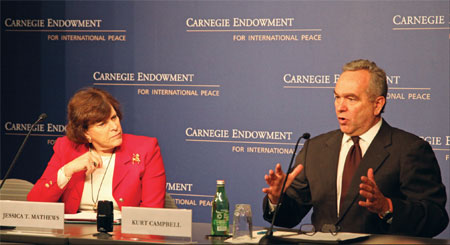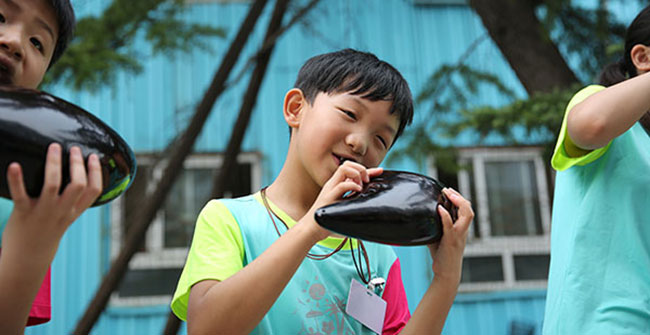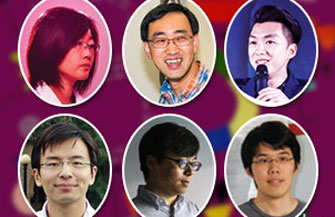US calls for calm over islands
By Chen Weihua in Washington (China Daily) Updated: 2013-01-11 11:58
|
Kurt Campbell, US assistant secretary of state for East Asian and Pacific affairs, gives a speech on Thursday in Washington on American policy in the region and toward China. Sun Chenbei / China Daily |
As tension flared anew this week between China and Japan over the Diaoyu Islands in the East China Sea, a senior State Department official said the United States wants cooler heads to prevail.
"We want both countries to recognize that, literally, northeast Asia is too important to the global economy. We cannot afford to have continuing tension degrade relations between the two most important countries in Asia - Japan and China, not only for our security, but our economic prosperity going forward," Kurt Campbell, assistant secretary of state for East Asian and Pacific affairs, said on Thursday at a forum on Asia at the Carnegie Endowment for International Peace in Washington.
He said the US has been involved in quiet diplomacy in the region. Later on Thursday, Campbell and his boss, Secretary of State Hillary Clinton, had a closed-door meeting at the State Department with Chinese Vice-Foreign Minister Cui Tiankai.
On Thursday in Beijing, Foreign Ministry spokesman Hong Lei said Chinese vessels and aircraft would continue regular missions to safeguard the sovereignty of the Diaoyu Islands.
Campbell, along with White House and Defense Department officials, will leave for Tokyo next week to consult with Japanese officials over the islands issue. The State Department's top Asia expert said a quiet, behind-the-scenes approach is likely to prove more effective than one that's more public.
Zha Daojiong, a professor in Peking University's School of International Studies, said that if the US is genuinely neutral in the dispute, as Washington has claimed, the Americans should convene a meeting with Chinese and Japanese representatives to demonstrate this.
"We want to pay attention to details and see what the US is doing, not what it is saying," Zha told China Daily after Campbell's Carnegie Endowment speech on a new comprehensive strategy toward Asia.
Campbell, who has been instrumental in shaping President Barack Obama's policy on East Asia for the past four years, said Washington is committed to building a strong, multifaceted and comprehensive partnership with China. He described this as a major goal for US foreign policy but one that requires hard work to achieve.
"We do this because the world expects the United States and China to get along, that we work to overcome our differences and work intensively to understand each other and appreciate each other's perspectives," he said.
The US encourages all countries in Asia to have good relations with China, according to Campbell.
"We believe it's in their best interest and it's in our best interest. They're not the only ones that want good relationships with China - we do as well.
"No country needs to choose between the United States and China, or India or Japan," the diplomat added.
Campbell said countries that are successful, in Asia or elsewhere, generally have positive relations with all countries, particularly the US and China.
There is broad consensus throughout the world that much of 21st-century history will be written in Asia, he said. "I don't think there is any doubt about that."
Despite lingering mistrust between China and the US, Campbell said he's confident that both countries have people who are committed to improving bilateral relations. But he lamented that there aren't enough Americans with expertise on Asia to fill important positions in the US government.
Orville Schell, director of the Asia Society's Center on US-China Relations, recently told China Daily that the two countries' relationship could benefit from experience like that of Henry Paulson, who was George W. Bush's Treasury secretary.
Paulson, who developed knowledge about China during frequent business trips as a top Goldman Sachs Group Inc executive, played a "constructive and positive role" as a cabinet official, and made his Chinese counterparts feel "comfortable", Schell said.
He said he hoped Vice-President Joe Biden might be designated for a similar kind of role during Obama's second term.
chenweihua@chinadaily.com.cn
- Wedding businesses need tweak, report says
- Plan targets antimicrobial resistance
- China to join Australia, US in exercises
- Ex-Yunnan official expresses remorse in corruption trial
- Telecom fraud blamed in death of college applicant
- Talks with Manila at early date expected
- Authorities stop illegal broadcasts
- More polluters punished under tougher regulation
- Respect, protect nature during development: Xi
- Wraps come off design of Mars probe











